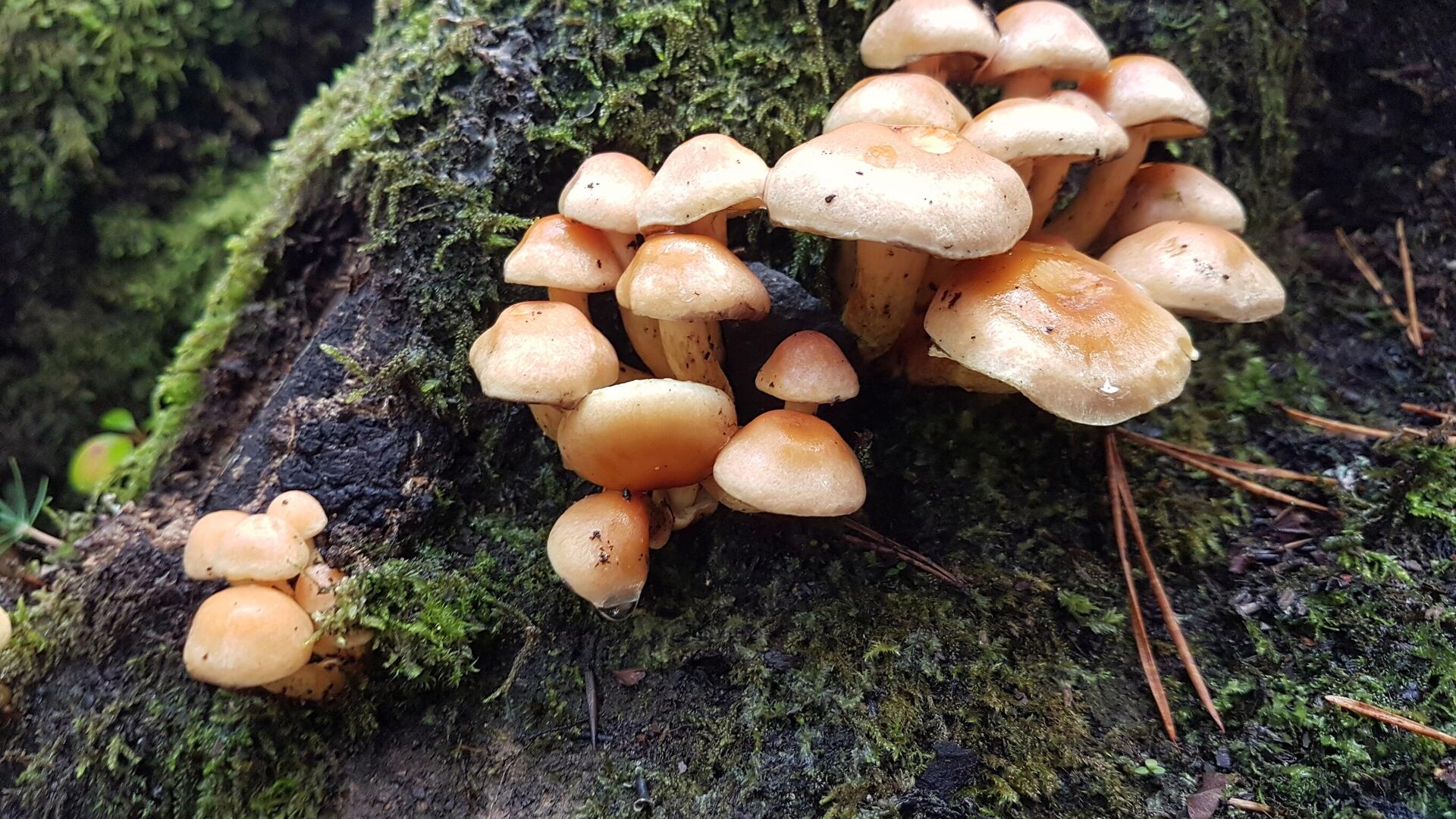https://sputnikglobe.com/20230605/fungi-absorb-about-third-of-total-greenhouse-gas-emissions---study-1110935282.html
Fungi Absorb About Third of Total Greenhouse Gas Emissions - Study
Fungi Absorb About Third of Total Greenhouse Gas Emissions - Study
Sputnik International
Climate scientists have discovered that fungi store huge amounts of carbon dioxide in them each year, equivalent to 13.1bln tonnes of carbon dioxide, which compares to a third of the emissions from burning fossil fuels.
2023-06-05T21:41+0000
2023-06-05T21:41+0000
2023-06-05T21:41+0000
beyond politics
science & tech
earth
university of sheffield
biology
fungi
green economy
greenhouse emissions
greenhouse effect
https://cdn1.img.sputnikglobe.com/img/07e7/06/05/1110935121_0:257:2730:1793_1920x0_80_0_0_40fcdf954fa59daab1cc609bf8d77085.jpg
A new study reveals that fungi play a crucial role in mitigating climate change by storing more than a third of the world's annual fossil fuel emissions. The research, conducted by a team of scientists from various institutions, including the University of Sheffield, found that fungi pull 36% of global fossil fuel emissions from the atmosphere. The study highlights the significant carbon storage capacity of fungi and calls for their inclusion in conservation and biodiversity policies.Fungi, which encompass a vast underground network, including mycorrhizal fungi that form symbiotic relationships with plants, act as a "carbon bank" by absorbing carbon dioxide from the air and storing it in the soil. The researchers estimate that globally, plants transfer around 13 gigatons of carbon dioxide to underground fungi each year.However, human activities such as agriculture, mining, and industry disrupt these fungal networks, posing a threat to their carbon storage capabilities.The study emphasizes the importance of protecting these underground fungal networks, not only for biodiversity but also for combating climate change. The UN warns that 90% of the Earth's topsoil, which plays a critical role in sustaining crops and forests, could be at risk of degradation by 2050.While the specifics of how carbon is stored in fungi are still not fully understood, the researchers are exploring ways to increase the soil's carbon-holding capacity. They are investigating the duration of carbon storage by fungi and the broader role fungi play in Earth's ecosystems.The findings of this research underscore the need to consider fungi in efforts to limit global heating and safeguard ecosystems. This study as a whole adds to the growing recognition of fungi as essential actors in the fight against climate change and prompts further investigation into their potential contributions to achieving net-zero emissions.The findings were published in Current Biology journal.
https://sputnikglobe.com/20230321/drug-resistant-fungus-spreads-through-healthcare-facilities-in-us-cdc-warns-1108639870.html
earth
Sputnik International
feedback@sputniknews.com
+74956456601
MIA „Rossiya Segodnya“
2023
News
en_EN
Sputnik International
feedback@sputniknews.com
+74956456601
MIA „Rossiya Segodnya“
Sputnik International
feedback@sputniknews.com
+74956456601
MIA „Rossiya Segodnya“
greenhouse gas, gas pollution, fungi, bicycle of earth, green house effect, university of sheffield
greenhouse gas, gas pollution, fungi, bicycle of earth, green house effect, university of sheffield
Fungi Absorb About Third of Total Greenhouse Gas Emissions - Study
Climate scientists have discovered that fungi store huge amounts of carbon dioxide in them each year, equivalent to 13.1 billion tonnes of carbon dioxide, which compares to a third of the emissions from burning fossil fuels.
A new study reveals that fungi play a crucial role in mitigating climate change by storing more than a third of the world's annual fossil fuel emissions. The research, conducted by a team of scientists from various institutions, including the University of Sheffield, found that fungi pull 36% of global fossil fuel emissions from the atmosphere. The study highlights the significant carbon storage capacity of fungi and calls for their inclusion in conservation and biodiversity policies.
Fungi, which encompass a vast underground network, including mycorrhizal fungi that form symbiotic relationships with plants, act as a "carbon bank" by absorbing carbon dioxide from the air and storing it in the soil. The researchers estimate that globally, plants transfer around 13 gigatons of carbon dioxide to underground fungi each year.
"Mycorrhizal fungi represent a blind spot in carbon modelling, conservation, and restoration - the numbers we’ve uncovered are jaw-dropping, and when we’re thinking about solutions for climate we should also be thinking about what we can harness that exists already," said Katie Field, Professor of Plant-Soil Processes at the University of Sheffield and co-author of the study.
However, human activities such as agriculture, mining, and industry disrupt these fungal networks, posing a threat to their carbon storage capabilities.
The study emphasizes the importance of protecting these underground fungal networks, not only for biodiversity but also for combating climate change. The UN warns that 90% of the Earth's topsoil, which plays a critical role in sustaining crops and forests, could be at risk of degradation by 2050.
"Understandably, much focus has been placed on protecting and restoring forests as a natural way to mitigate climate change, but little attention has been paid to the fate of the vast amounts of carbon dioxide that are moved from the atmosphere during photosynthesis by those plants and sent belowground to mycorrhizal fungi," said Dr Heidi Hawkins, lead author of the study from the University of Cape Town.
While the specifics of how carbon is stored in fungi are still not fully understood, the researchers are exploring ways to increase the soil's carbon-holding capacity. They are investigating the duration of carbon storage by fungi and the broader role fungi play in Earth's ecosystems.
The findings of this research underscore the need to consider fungi in efforts to limit global heating and safeguard ecosystems. This study as a whole adds to the growing recognition of fungi as essential actors in the fight against climate change and prompts further investigation into their potential contributions to achieving net-zero emissions.
The findings were published in
Current Biology journal.



